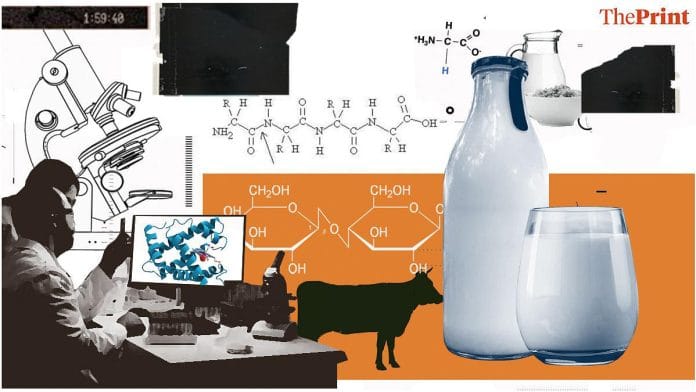New Delhi: Experts have termed claims of superiority of dairy products—particularly milk and ghee—based on their A1 and A2 protein classifications as devoid of scientific backing. Companies selling dairy products labelled as A1 or A2, they say, are misleading consumers.
Speaking to ThePrint, R.S. Sodhi, president of the Indian Dairy Association, criticised companies for “fooling customers” and charging them two to three times more for products marketed as A2.
“Milk is inherently good for health because it provides complete nutrition—protein, calcium, fat, and vitamins—but to claim one type of protein is better than the other is unfounded,” he said.
He added that at the ground level, it is challenging to determine whether milk is A2 since identifying it requires extensive genetic testing, which is time-consuming and resource-intensive. Therefore, he said, “Practically speaking, it is not feasible for every small company to verify if milk is A1 or A2 during regular dairy operations.”
The Food Safety and Standards Authority of India (FSSAI) issued an advisory Wednesday, instructing all e-commerce food business operators (FBOs) to remove A1 and A2 claims from milk, ghee, butter, curd, and other dairy products. According to it, food laws in India “do not mention/recognise any differentiation of milk on the basis of A1 and A2 types”.
“Use of any A2 claims on milk fat products is misleading and not in conformance with the provisions laid down under FSS Act, 2006 and regulations made thereunder,” read the advisory issued by the FSSAI.
A quick search for A2 cow ghee on Amazon revealed more than 20 companies marketing their products as A2, with prices starting at no less than Rs 700.
Vedic Ghee, for example, sells a premium product labelled “Vedic Ghee Premium A2 Gir Cow Cultured Ghee” for Rs 1,989, claiming it is the “Purest A2 Vedic Ghee for your family—Direct from Farm to your Home”. Other companies, such as Anveshan, market their ghee as A2, while Country Delight sells milk marketed as A2.
ThePrint reached the above mentioned companies for comment via email but had not received a response by the time of publication. This report will be updated if and when a response is received.
J.B. Prajapati, chairman of the Indian Dairy Association in the western zone, had earlier flagged this issue—in 2018 and 2019. Speaking to ThePrint, he called such labels a “marketing gimmick”, pointing out that the differences in protein composition in A1 and A2 milk are not as significant as these companies suggest.
He explained that milk contains several proteins, with caseins being the main one. Beta-casein is the most significant, existing in two forms—A1 and A2. Over time, variations in beta-casein occurred due to hereditary, ecological, or adaptive changes. In A2 beta-casein, the amino acid at the 67th position is proline, while in A1, it is histidine.
This difference leads to the release of different peptides when these proteins break down. A2 casein releases a peptide of nine amino acids called BCM9, whereas A1 releases a different peptide of seven amino acids called BCM7.
“Some people speculate that since BCM7 has links to lifestyle diseases, such as hypertension and diabetes, A2 is better since it is not associated with these issues. However, there is no strong scientific evidence to support such claims,” he said.
Seema Gulati, head of the Nutrition Research Group at the National Diabetes Obesity and Cholesterol Foundation, told ThePrint that there is only a very slight difference in how people digest A2 milk, with some individuals experiencing less gastric bloating.
Aside from this minor difference in digestibility, Gulati said, there is no significant variation in terms of protein between A1 and A2 milk.
She also advised that, in light of the latest advisory, consumers should focus on the quality of the milk, ensuring that it is “not adulterated and, to some extent, more organic”.
Prajapati too noted that some companies use misleading labels. They do not directly label their products as A2 ghee because, technically, ghee cannot be categorised as A1 or A2 since it does not contain protein. Instead, they label the product as ghee made from A2 milk, which can confuse consumers who may not understand that the A2 protein does not carry over into the ghee.
The FSSAI has asked food business operators (FBOs) to remove these labels immediately and to use up any pre-printed labels within six months from the date of this advisory.
ThePrint also reached Blinkit, Swiggy and Amazon, where these products are still available, for comment and is awaiting their responses.
(Edited by Madhurita Goswami)
Also Read: FSSAI proposes move to have salt, sugar & fat related info in bold, bigger font on packaged foods







These so called ” experts” are paid by the dairy businesses…..and anything which has some sort of connection the belief system of Hinduism must be bashed and stopped …this is what ” journalists ” believe.Till you treat cows as milk giving machines and bestow cruelty on her calfs ….you are barbaric guttery animal!